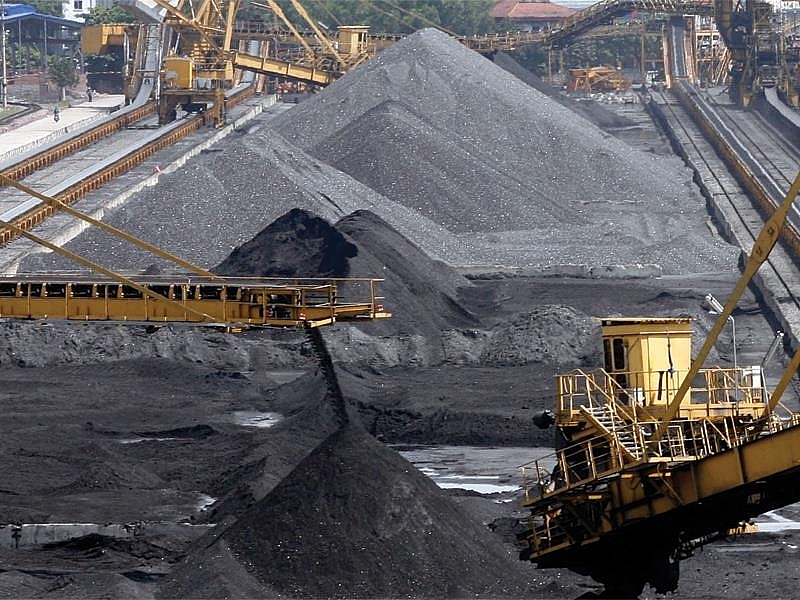Moody’s affirms Vinacomin’s B3 rating amid slower coal export
“Vinacomin’s B3 rating is primarily driven by its standalone credit quality as captured by its b3 baseline credit assessment, which in turn continues to reflect its strategic importance in managing Vietnam’s coal and mineral reserves, and its demonstrated access to low-cost credit from the local banking sector to support its expansion projects,” said Moody’s lead analyst for Vinacomin, Maisam Hasnain.
The company has a long-dated reserve life with substantial reported coal reserves (over two billion tonnes). This translates into a reserve life of over 50 years based on its 2018 expected production of 36 million tonnes. Accounting for about 70 per cent of its revenue, coal sales will remain the primary contributor to Vinacomin’s operations.
 |
| Despite falling coal exports, Moody's sees Vinacomin's future as stable |
Vinacomin, however, may have to face a narrow coal export market as Vietnamese coal products do not meet the requirements of importing countries. China has recently requested to reappraise the quality of the coal imported from Vietnam to align with standards on trace elements.
Vinacomin ealier on collaborated with its Chinese partners to take and analyse samples of coal to conclude that Vietnamese coal products did not meet the requirements, leaving 2.5 million tonnes of dust coal unmarketable in Vang Danh-Uong Bi.
China started to reduce Vietnamese coal imports a while ago now. According to data from Vietnam Customs, coal exports were kept at a reasonably high level in 2010-2014, but sharply declined since 2015.
In 2010, China bought 14.644 million out of the 19.827 million tonnes of coal exported by Vietnam. By 2014, coal exports to this market decreased to 4.139 million tonnes. In 2015, Vietnam Customs did not record any coal exported to China. In 2016 and 2017, the agency recorded only several thousand tonnes.
China is known to not accept low-quality coal imports anymore. As a result, Vietnam’s coal inventory raised to 8.75 million tonnes in 2015, 9.42 million tonnes in 2016, and over nine million in 2017.
The volume of Vietnam's coal export in 2017 only met 50 per cent of the set goal. Last year, the country exported 2.229 million tonnes of coal, way below the target of four million tonnes.
Moody’s opinion of Vinacomin’s ablility to meet all of its financial obligations (B3 rating), meanwhile, recognises key challenges including Vinacomin’s large debt-funded capex programme; the standard, quality, and timeliness of its consolidated financial reporting; its dependence on short-term bank funding; and the limited degree of clarity regarding long-term shareholder intentions and strategic direction.
“The rating is constrained by Vinacomin’s large capex plans which will keep its adjusted leverage—as measured by adjusted debt to EBITDA—elevated at around 5.5-6.0x, and its high dependence on short-term debt to fund its operations,” noted Hasnain.
“However, based on its status as a state-owned enterprise, Vinacomin has built long-standing relationships with banks and financial institutions in Vietnam and has a track record of successfully rolling over its short-term bank loans,” added Hasnain.
While Vinacomin is 100 per cent owned by the Vietnamese government (B1 positive), Moody’s believes that the government is unlikely to provide more than selective and partial support in a distress situation, and Vinacomin’s rating therefore does not include any uplift for expected government support.
The stable outlook reflects Moody’s expectation that the company’s leverage will remain elevated but within its rating parameters while it works to improve its cost competitiveness amid increasing coal imports in Vietnam. The outlook also takes into account Vinacomin’s proven access to state-owned banks and the domestic bond market as it carries out its capital investment plans.
What the stars mean:
★ Poor ★ ★ Promising ★★★ Good ★★★★ Very good ★★★★★ Exceptional
Related Contents
Latest News
More News
- PM urges Ho Chi Minh City to innovate and remain Vietnam’s economic locomotive (November 26, 2025 | 15:29)
- Experts chart Vietnam's digital finance path: high hopes, high stakes (November 14, 2025 | 10:56)
- Vietnam’s seafood imports surge 30 per cent in first 10 months (November 10, 2025 | 19:35)
- Vietnam’s durian exports hit $1 billion milestone (October 30, 2025 | 17:41)
- Beyond borders: Sunhouse and new era of Vietnamese brands on Amazon (October 28, 2025 | 10:46)
- Record-breaking trade fair set to open in Hanoi (October 15, 2025 | 15:59)
- Timber sector seeks solutions to VAT refunds (October 14, 2025 | 18:58)
- Tether explores investment prospects in Vietnam’s digital asset sector (October 10, 2025 | 18:09)
- Vietnamese investors pour nearly $847 million into overseas markets in nine months (October 08, 2025 | 18:42)
- Vietnam amends Law on Civil Aviation to create drive airport investment (October 03, 2025 | 18:29)

 Tag:
Tag:




























 Mobile Version
Mobile Version